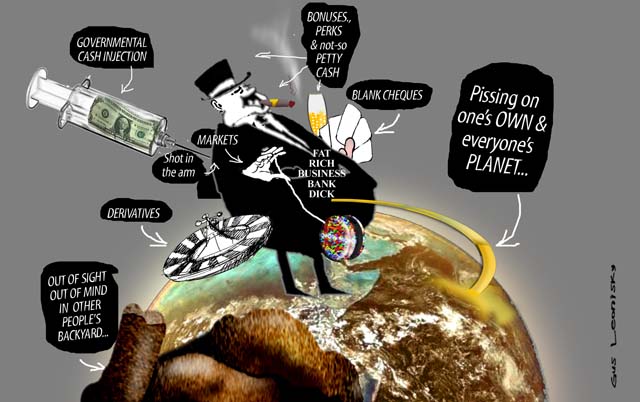Search
Recent comments
- NZ leaks....
1 hour 35 min ago - help?....
2 hours 20 min ago - maps....
2 hours 32 min ago - bastards...
8 hours 56 min ago - narcissist.....
10 hours 7 min ago - morality as a weapon....
10 hours 15 min ago - cheating dicks....
10 hours 26 min ago - big fibs...
10 hours 54 min ago - merz vs iran....
11 hours 1 min ago - maturity....
14 hours 30 min ago
Democracy Links
Member's Off-site Blogs
the little prince...

Lack of urgency in the Durban meeting halls and pressing issues elsewhere threaten to block progress as the UN climate summit enters its final days.
Some delegates said there was no clear process for bridging divides.
Others suggested that the EU summit on Thursday and Friday would see European leaders "thinking of the euro crisis, not the climate crisis".
Most nations appear to want a strong deal - but the exceptions are some of the world's most powerful countries.
The US, India, China and Brazil are among those likely to oppose parts of the solution sought by the EU and the majority of developing countries.
As those four together account for nearly half of the world's emissions, the diplomacy is harder than the mere numbers might indicate.
With two days left to run in the South African city, some experienced delegates said the talks appeared to lack urgency.
By this stage in last year's meeting, they said, the Mexican hosts had already decided a process to resolve outstanding differences; but that is not the case here.
- By Gus Leonisky at 8 Dec 2011 - 8:22pm
- Gus Leonisky's blog
- Login or register to post comments
a rose with too many thorns...
Climate Change Minister Greg Combet has threatened Australia will not be part of the next round of the Kyoto Protocol unless it is part of a wider agreement covering major polluters.
Addressing the global climate change talks in Durban, Mr Combet said a second commitment period of the Kyoto Protocol may only cover 15 per cent of global emissions.
"A more comprehensive agreement is fundamental for environmental effectiveness," Mr Combet told the conference.
"Australia's position remains unchanged - we will be part of a second commitment period only if it is a part of a wider agreement covering all major emitters."
The Kyoto agreement, which sets lower emission targets for participating countries, appears in trouble, with both the United States and China refusing to pledge support.
China wants to be considered a developing country with lower obligations, and the US wants all countries to be treated equally.
The Kyoto agreement runs out at the end of next year, but so far there has been deadlock on whether to renew, as favoured by China and India, or to draw up a new treaty, as favoured by Russia, Canada and Japan.
The climate change conference in Copenhagen in 2009 reached a stalemate over Kyoto, with many predicting a similar outcome for the current talks in Durban.
Mr Combet's speech has prompted the Greens to call on the Government for an explanation of its position on extending the Kyoto Protocol.
Senator Bob Brown says Australia should be committed to the second round.
"We should be putting maximum pressure onto the big players like China, the US, Russia and India to do the same, but there's no clear evidence that Australia is supporting a new outcome which is going to aim at tougher targets in reducing greenhouse gas emissions," he said.
http://www.abc.net.au/news/2011-12-08/combet-threatens-climate-change-kyoto-withdrawal/3720086
the price of exaggeration...
By PAUL KRUGMANIn 2011, as in 2010, America was in a technical recovery but continued to suffer from disastrously high unemployment. And through most of 2011, as in 2010, almost all the conversation in Washington was about something else: the allegedly urgent issue of reducing the budget deficit.
This misplaced focus said a lot about our political culture, in particular about how disconnected Congress is from the suffering of ordinary Americans. But it also revealed something else: when people in D.C. talk about deficits and debt, by and large they have no idea what they’re talking about — and the people who talk the most understand the least.
Perhaps most obviously, the economic “experts” on whom much of Congress relies have been repeatedly, utterly wrong about the short-run effects of budget deficits. People who get their economic analysis from the likes of the Heritage Foundation have been waiting ever since President Obama took office for budget deficits to send interest rates soaring. Any day now!
And while they’ve been waiting, those rates have dropped to historical lows. You might think that this would make politicians question their choice of experts — that is, you might think that if you didn’t know anything about our postmodern, fact-free politics.
But Washington isn’t just confused about the short run; it’s also confused about the long run. For while debt can be a problem, the way our politicians and pundits think about debt is all wrong, and exaggerates the problem’s size.
http://www.nytimes.com/2012/01/02/opinion/krugman-nobody-understands-debt.html?pagewanted=print
destroying the planet at a rate of knots...
At the rate things are going, the Earth in the coming decades could cease to be a “safe operating space” for human beings. That is the conclusion of a new paper published Thursday in the journal Science by 18 researchers trying to gauge the breaking points in the natural world.
The paper contends that we have already crossed four “planetary boundaries.” They include the extinction rate; deforestation; the level of carbon dioxide in the atmosphere; and the flow of nitrogen and phosphorous (used on land as fertilizer) into the ocean.
“What the science has shown is that human activities — economic growth, technology, consumption – are destabilizing the global environment,” said Will Steffen, who holds appointments at the Australian National University and the Stockholm Resilience Center and is the lead author of the paper.
read more: http://www.washingtonpost.com/national/health-science/scientists-human-activity-has-pushed-earth-beyond-four-of-nine-planetary-boundaries/2015/01/15/f52b61b6-9b5e-11e4-a7ee-526210d665b4_story.html
See toon and story at top...